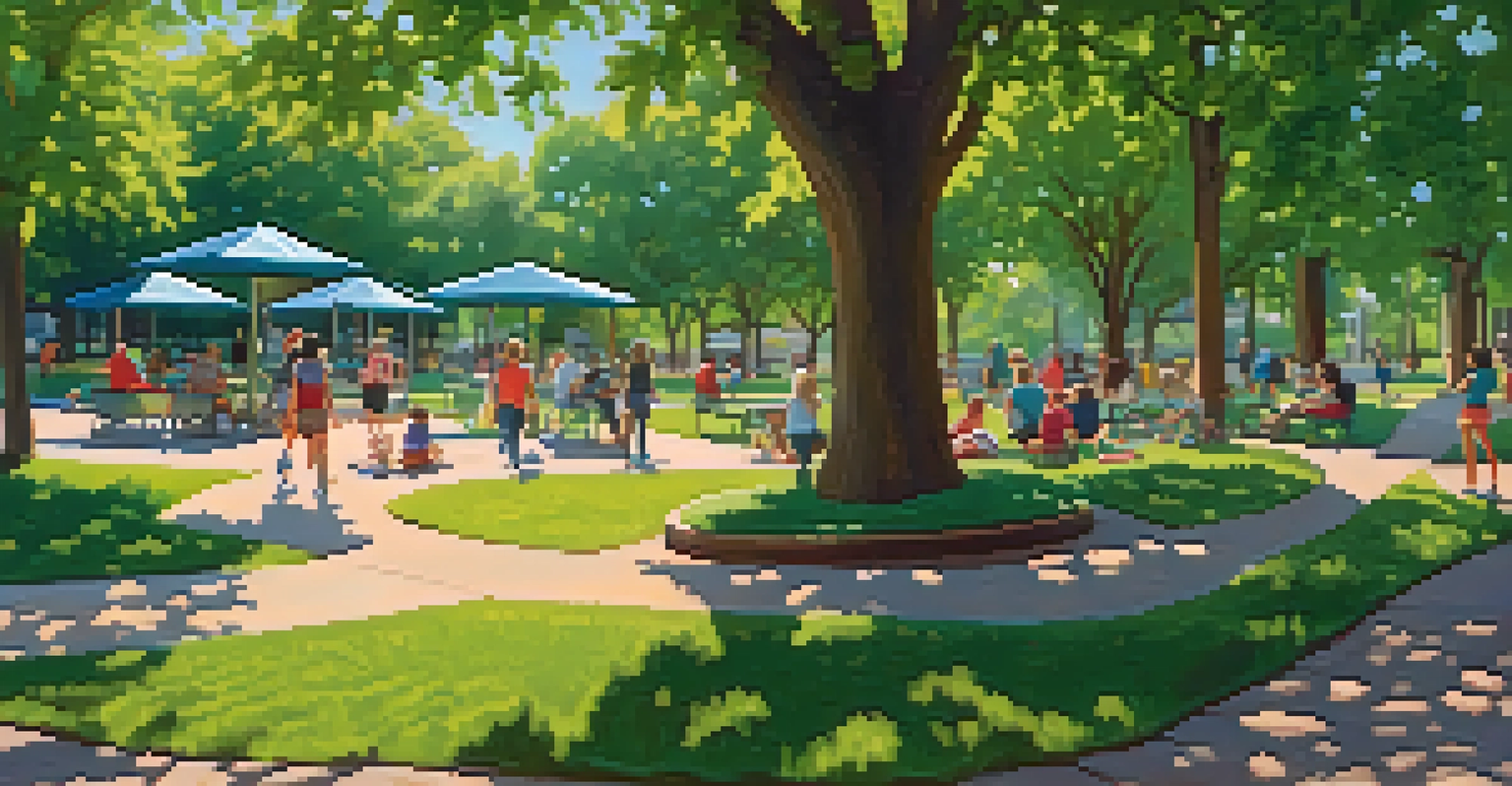Nashville's Real Estate Market: The Rise of Suburban Living

Understanding Nashville's Real Estate Landscape
Nashville, known for its vibrant music scene and rich culture, has seen significant changes in its real estate market in recent years. With an influx of new residents, fueled by job opportunities and a high quality of life, the housing demand has surged. This growth has led many to explore not just the city itself but the surrounding suburban areas, making them an attractive option for homebuyers.
Suburbia is where the developer bulldozes out the trees, then names the streets after them.
The allure of suburban living lies in the promise of more space and often more affordable housing options. Families, in particular, are drawn to the prospect of larger homes with backyards, away from the hustle and bustle of downtown. As a result, towns like Franklin, Brentwood, and Mount Juliet have become hotspots for those seeking a balance between city amenities and suburban tranquility.
Moreover, the pandemic has shifted priorities for many, with remote work becoming more common. This shift has allowed people to live further from their offices without the daily commute, prompting a rise in suburban living. Consequently, Nashville's suburban neighborhoods have become increasingly desirable, adding to the ever-growing real estate landscape.
Key Factors Driving Suburban Growth
Several factors contribute to the rise of suburban living in the Nashville area. Firstly, the affordability of homes in suburban regions often stands in stark contrast to the higher prices of urban properties. This financial incentive allows families and first-time buyers to invest in larger homes that suit their lifestyle needs.

Additionally, suburban areas generally offer a more family-friendly environment. With access to parks, schools, and recreational facilities, parents often find these neighborhoods more appealing for raising children. The sense of community that many suburbs foster further enhances their attractiveness, drawing in those seeking a welcoming atmosphere.
Surge in Suburban Living Demand
Nashville's real estate market has seen a significant increase in demand for suburban homes due to a combination of affordability, remote work flexibility, and the appeal of family-friendly environments.
Lastly, Nashville's expanding infrastructure, including new schools, shopping centers, and public transport options, makes suburban living more convenient than ever. As these areas continue to develop, they become increasingly equipped to meet the demands of new residents, solidifying their place as desirable options in the real estate market.
The Impact of Remote Work on Housing Choices
The COVID-19 pandemic has significantly reshaped how we view work and home life. With many companies adopting flexible work-from-home policies, employees are no longer tethered to city centers for their jobs. This newfound freedom has led many to consider suburban living as a viable option, where they can enjoy more space and a quieter lifestyle.
The future belongs to those who believe in the beauty of their dreams.
Suburban homes often come with larger square footage compared to urban apartments, providing families with the room they need for home offices, play areas, and outdoor spaces. This shift in priorities has made many buyers reassess their living situations, opting for homes that accommodate their evolving needs amidst changing work environments.
As remote work continues to gain traction, we can expect to see a sustained interest in suburban properties. This trend not only reflects a change in personal priorities but also signals a broader shift in how we define work-life balance and the spaces we choose to inhabit.
Popular Suburbs in the Nashville Area
When it comes to suburban living near Nashville, several towns stand out for their unique offerings. Franklin, known for its historic charm and vibrant downtown, has become a go-to destination for families looking for a mix of culture and community. Its picturesque streets and excellent schools make it an increasingly popular choice.
Brentwood, on the other hand, boasts some of the highest-rated schools in the state, making it a prime location for families focused on education. With its well-planned neighborhoods and ample parks, Brentwood attracts those who appreciate a suburban lifestyle without sacrificing proximity to Nashville's amenities.
Challenges of Suburban Growth
The rapid growth of suburban areas presents challenges such as infrastructure strain, rising housing prices, and environmental concerns that need to be addressed for sustainable development.
Mount Juliet has also gained traction as a suburban haven, especially for those looking for affordable housing options. With its growing retail spaces and family-oriented activities, this suburb offers a welcoming environment for newcomers and long-time residents alike, further contributing to the rise of suburban living in the Nashville area.
Challenges Facing Suburban Development
While the rise of suburban living presents many opportunities, it also comes with its own set of challenges. One significant issue is the strain on infrastructure as more people flock to these areas. Increased traffic congestion and longer commute times can diminish the appeal of suburban living, counteracting some of its benefits.
Furthermore, the rapid growth of suburban areas can lead to a lack of available housing, driving prices up and making it harder for first-time buyers to enter the market. As demand outpaces supply, communities must find ways to balance development with sustainability, ensuring they maintain their charm while accommodating new residents.
Lastly, the environmental impact of suburban sprawl cannot be overlooked. As more land is developed for housing, it can lead to the loss of green spaces and natural habitats. Addressing these challenges will be crucial for maintaining the quality of life that attracts residents to Nashville's suburbs.
The Role of Real Estate Agents in Suburban Growth
In this evolving market, real estate agents play a vital role in helping buyers navigate the complexities of suburban living. With their local knowledge and expertise, agents can provide valuable insights into the best neighborhoods that fit a family's needs and budget. Their understanding of market trends helps buyers make informed decisions in a competitive landscape.
Agents also facilitate connections between buyers and the community, often highlighting schools, parks, and local amenities that contribute to the appeal of suburban areas. By showcasing the benefits of suburban living, they help to bridge the gap between potential buyers and their ideal homes.
Future of Nashville's Suburbs
The suburban real estate market in Nashville is expected to continue growing as more families seek spacious living, supported by ongoing improvements in infrastructure and amenities.
Moreover, as the demand for suburban properties continues to rise, agents must adapt their strategies to meet changing buyer preferences. This ensures they remain relevant in a fast-paced market, ultimately guiding clients toward fulfilling their dream of suburban living in the Nashville area.
The Future of Nashville's Suburban Real Estate Market
Looking ahead, the suburban real estate market in Nashville is likely to continue its upward trajectory. As more individuals and families seek the balance of space and convenience, the demand for suburban homes will remain strong. This trend is expected to reshape the local landscape, influencing everything from housing developments to community planning.
Additionally, with ongoing improvements in infrastructure and amenities, suburban areas are poised to become increasingly attractive. As new businesses and services emerge, the overall quality of life in these regions will enhance, further enticing prospective buyers to consider suburban living as a viable option.

Ultimately, Nashville's real estate market reflects broader societal shifts in work, family, and lifestyle preferences. As the city evolves, so too will its suburbs, adapting to meet the needs of a diverse and growing population, making them an integral part of Nashville's future.